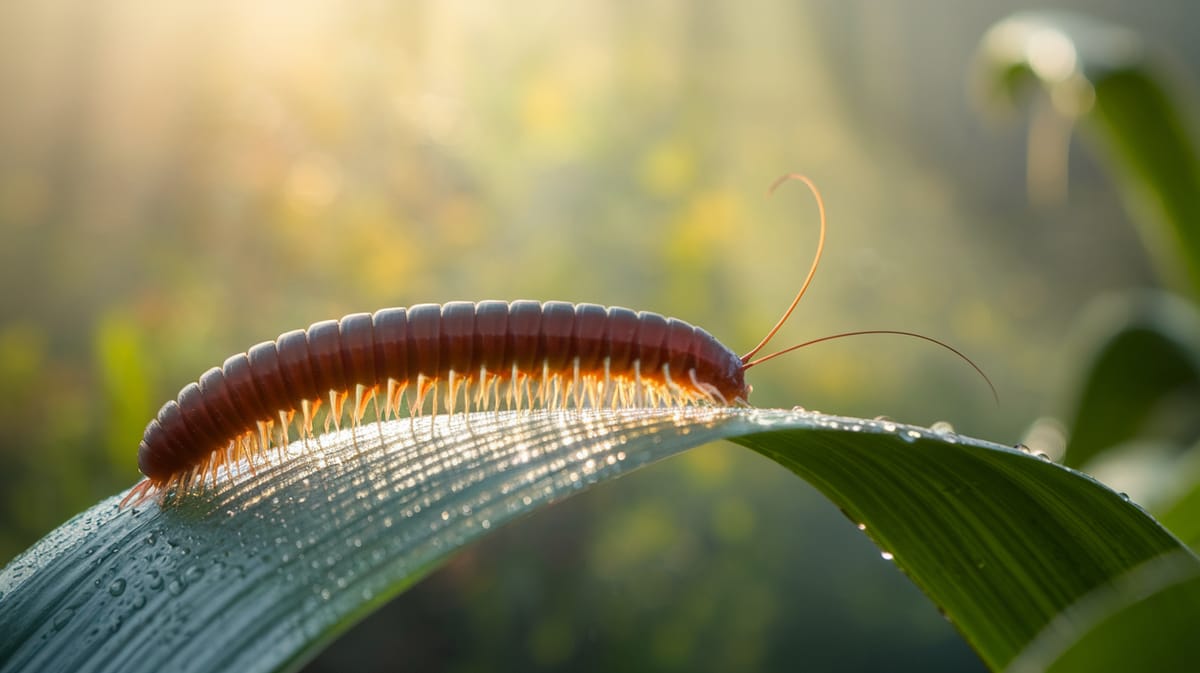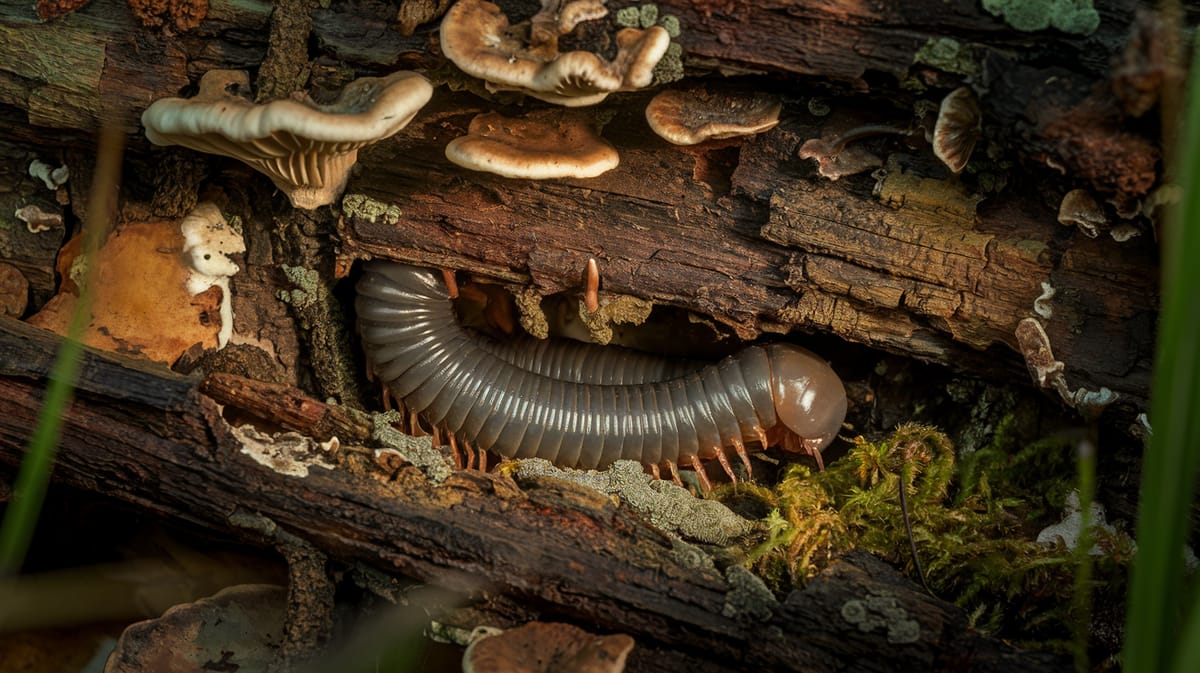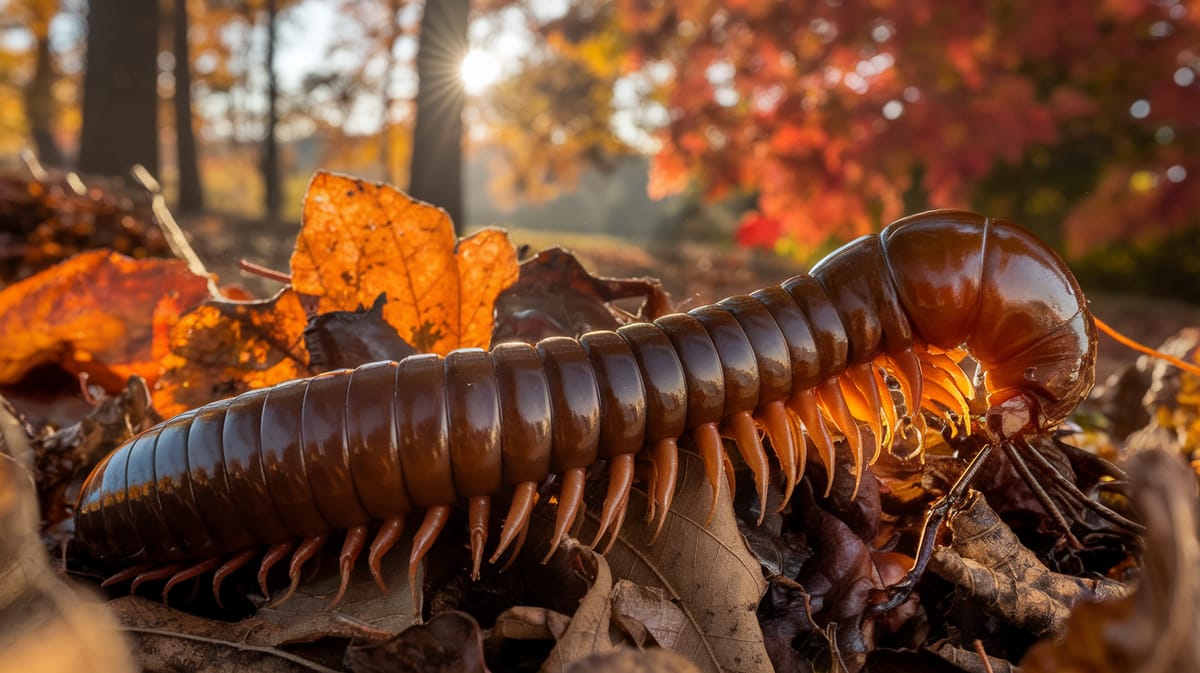Greenhouse Millipede
Graceful recycler of the forest floor, the Greenhouse Millipede thrives on decaying plant matter, aiding in nutrient cycling. Its delicate multilegged movement is a sight to behold.

Gallery

Key Insights at a Glance
Did You Know?
Taxonomy & Classification
Greenhouse millipedes possess elongated bodies with numerous segments, adapted for efficient decomposition in varied environments. Their anatomy reflects a unique evolutionary path within soil ecosystems. Let's understand the evolutionary journey and classification of these remarkable decomposers.
Global Spread
The greenhouse millipede, Oxidus gracilis, is found worldwide, thriving in greenhouse conditions and temperate zones.
Evolutionary Resilience
Dating back to the Carboniferous period, diplopods like the greenhouse millipede have survived dramatic climate shifts and evolved diverse survival strategies.
Lifecycle and Growth
A remarkable journey of transformation from Egg to Adult.
Egg
Tiny eggs are laid in soil, where they develop safely until hatching, nourished by moisture and organic matter.
Juvenile
Juveniles emerge with fewer legs, growing additional segments and legs through successive molts as they mature.
Adult
Fully developed adults have a cylindrical body and numerous legs, focusing on feeding, reproduction, and habitat maintenance.
Dietary Habits
A decomposer with specialized digestive enzymes, this insect primarily consumes decaying organic matter, aiding in nutrient recycling.
| DIET TYPE | DESCRIPTION |
|---|---|
| Primary Diet | Feeds mainly on decomposing plant material, including leaves, wood, and roots, breaking down cellulose efficiently. |
| Secondary Diet | Occasionally consumes fungi and algae found in its habitat, supplementing its nutrient intake. |
| Occasional | Rarely ingests small invertebrates or microorganisms, utilizing them as additional nutrient sources when available. |

Behaviour and Adaptations
Discover the unique traits and adaptations that define the Greenhouse Millipede.
Moisture Retention
Greenhouse Millipedes excel at conserving moisture in dry environments.
Decomposition Efficiency
Effective at breaking down organic matter, enriching soil health.
Burrowing Ability
Skilled burrowers, creating tunnels for shelter and moisture access.
Ecosystem Impact
Enhancing soil health and fostering biodiversity through the activities of the Greenhouse Millipede.
Soil Aeration Champion
Improves soil structure by burrowing and mixing organic matter.
Organic Matter Decomposer
Breaks down decaying plant material, enriching the soil with nutrients.
Biodiversity Supporter
Provides food for predators, sustaining various species in the food web.
Conservation Challenges
Understanding and addressing the challenges faced by the Greenhouse Millipede.
Habitat Destruction
Urbanization reduces available habitats, impacting millipede populations.
Chemical Exposure
Pesticides and industrial pollutants harm millipede health and ecosystems.
Climate Change
Altered weather patterns affect millipede survival and reproduction.
Frequently Asked Questions
How long do Greenhouse Millipede live?
Greenhouse Millipedes typically live for about one to two years. Their lifespan can vary based on environmental conditions and availability of food. They thrive in moist environments, which support their survival and lifecycle.
What do Greenhouse Millipede eat?
Greenhouse Millipedes are detritivores, meaning they feed on decaying plant material, fungi, and rotting leaves. They play a key role in breaking down organic matter and enriching soil.
Are Greenhouse Millipede poisonous?
Greenhouse Millipedes are not poisonous. They do not pose any significant threat to humans or pets, although they can release a mild defensive secretion that may cause minor skin irritation.
Are Greenhouse Millipede endangered?
Greenhouse Millipedes are not considered endangered. They are common in many regions, particularly in greenhouses and gardens, thriving in moist, shaded environments.
What do Greenhouse Millipede symbolize?
Greenhouse Millipedes are often seen as symbols of regeneration and recycling due to their role in breaking down organic matter and contributing to soil health. They are vital for nutrient cycling in ecosystems.
Do Greenhouse Millipede bite?
Greenhouse Millipedes do not bite. They have no interest in biting humans or animals, focusing instead on their primary role of consuming decomposing plant material.
What color are Greenhouse Millipede?
Greenhouse Millipedes are typically brown or grayish in color, with a cylindrical body and numerous legs. Their coloration helps them blend into their natural environment, aiding in camouflage.
Does a Greenhouse Millipede have wings?
Greenhouse Millipedes do not have wings. They are part of the Diplopoda class, which is characterized by multi-segmented bodies with two pairs of legs per segment, and they rely on walking for movement.
What does a Greenhouse Millipede look like?
Greenhouse Millipedes have elongated, cylindrical bodies with numerous segments, each bearing two pairs of legs. They are usually brown or gray, and their bodies are adapted for burrowing and moving through soil and leaf litter.
Is a Greenhouse Millipede an insect?
A Greenhouse Millipede is not an insect. It belongs to the class Diplopoda, which is distinct from insects. Millipedes have more legs and body segments than insects, and they lack wings and antennae found in most insects.
Related Insects
Discover insects with similar characteristics to Greenhouse Millipede - including shared habitats, diets, and taxonomic classifications
Share this profile
Help others discover Greenhouse Millipede